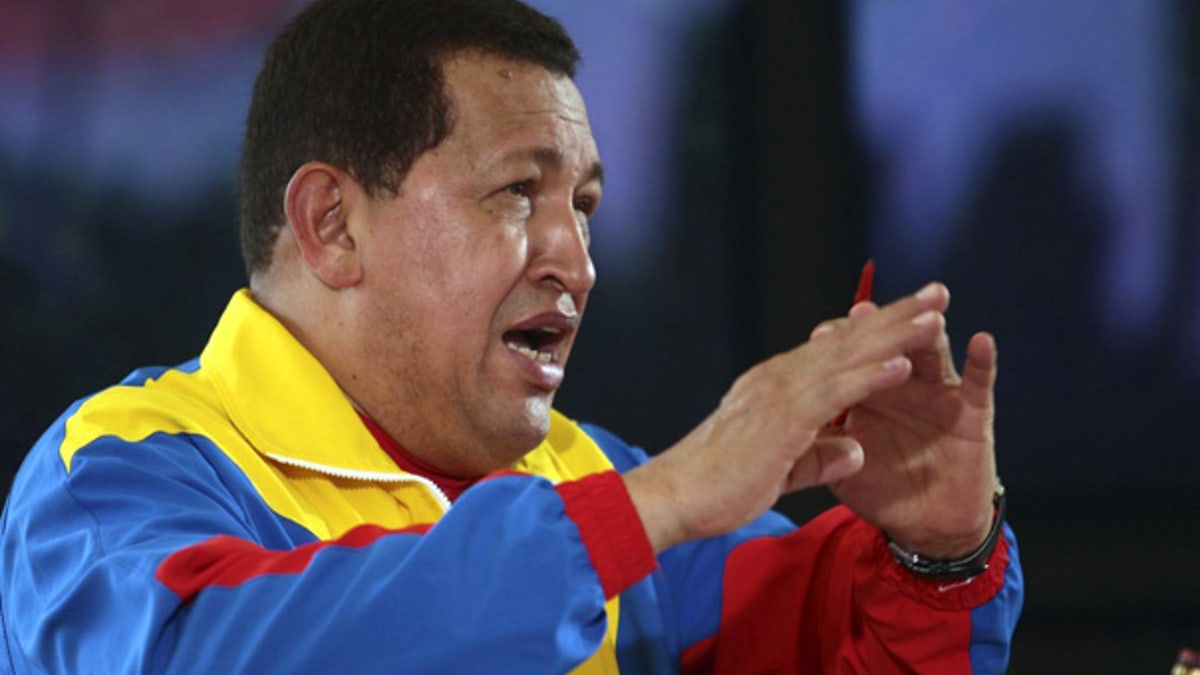
Oct. 3, 2010: Venezuela's President Hugo Chavez talks during his weekly broadcast in Guarico. (Reuters)
MOSCOW -- Venezuelan President Hugo Chavez reached a deal with Russia on Friday to build the South American country's first nuclear plant, as questions arose why a nation rich in oil and gas would feel the need to venture into nuclear energy.
The two nations also signed other energy agreements. Russia has cultivated close ties with Chavez's government to expand its global clout and counter U.S. influence in Latin America.
The ITAR-Tass news agency said Russia plans to build two 1,200 megawatt nuclear reactors at the Venezuelan plant. The cost of Friday's nuclear deal wasn't immediately announced.
The deal is likely to raise concern in President Barack Obama's administration but continues a pattern of Russia pressing to export its nuclear expertise.
Russia has just completed Iran's first nuclear power plant and recently reached new deals to build nuclear reactors in China and Turkey. It's talking with Indian officials about building a dozen of nuclear reactors there and also wants to build a nuclear reactor in the Czech Republic.
Russian President Dmitry Medvedev sought to pre-empt questions about why Venezuela would need nuclear power by saying the deal would help Caracas reduce its dependence on global market fluctuations.
"I don't know who will shudder at this," Medvedev said at a news conference after the signing. "The president (of Venezuela) said there will be nations that will have different emotions about that, but I would like to emphasize that our intentions are absolutely pure and open: We want our partner Venezuela to have a full range of energy possibilities."
Medvedev said Russia sees nuclear energy as a priority, despite its own hydrocarbon wealth, and described Russia's civilian nuclear technology as highly competitive abroad.
"We are building many plants in different countries, so why wouldn't build such a plant in our close partner, Venezuela?" he said. "That will offer a certain degree of independence in case of a drop in world energy prices."
Chavez said Venezuela wants to reduce its dependence on oil and gas and praised Russia for helping his country.
"Strategic cooperation with Russia gives my country a huge advantage," he said.
True to his flamboyant style, Chavez praised the Soviet Union and presented Medvedev with several bars of dark chocolate and cans of banana confiture and cocoa powder as the two leaders sat facing reporter's questions.
The Venezuelan leader has grown increasingly close to Russia, Iran and China while assailing U.S. policies, and his rhetoric about the need for a "multi-polar world" has resonated in Moscow.
"Russia and Venezuela staunchly support the creation of modern and fair world order, so that our future doesn't depend on the will and the liking of just one country, its welfare and mood," Medvedev said in a veiled reference to the United States.
Chavez plans to meet with Prime Minister Vladimir Putin later Friday.
In another deal signed after the talks, Russia's state oil company Rosneft agreed to buy from Petroleos de Venezuela S.A. 50 percent in Germany's Ruhr Oel GmbH, a 50-50 downstream joint venture between PdVSA and British oil giant BP. The Russian oil company will pay $1.6 billion for the stake, the company said in a statement.
Ruhr Oel holds stakes in four German refineries and petrochemical plants.
Rosneft president Eduard Khudainatov said the deal will help Rosneft "expand our presence with high quality assets in key international markets". The deal will leave 18 percent of Rosneft's refining capacity "in the heart of industrialized Europe."
Chavez's government has bought more than $4 billion in Russian weapons since 2005, including fighter jets, helicopters and 100,000 Kalashnikov rifles. New weapons deals have been under discussion, but no new agreements were announced Friday.
Russia and Venezuela also have launched a joint business to tap vast oil deposits in eastern Venezuela.
